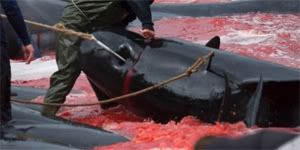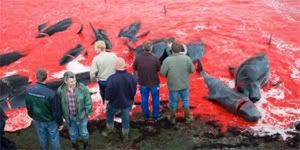
photo credit Stop the Grind
Pilot whales are the most common target, as their ancient migration paths cross the island waters. Other species that are killed include harbor porpoises, Atlantic white-sided dolphins and bottlenose dolphins.
The Faroese argue that their hunt is not commercial and that the animals are used for sustenance. Environmental and animal rights groups argue that in the modern Faroe Islands there is more than enough food to go around and the hunt is therefore unnecessary. Furthermore, the meat of the cetaceans has been proven to carry high levels of toxins such as PCBs and mercury and is dangerous for human consumption. Another Faroese argument is that the species are not endangered and the hunt does not pose a significant threat to the worldwide population. The official standing of both long-finned and short-finned pilot whales on the International Union for Conservation of Nature (IUCN)'s Red List of Threatened Species is "data deficient," and it means just that - we don't know. The hunts may be causing more damaging than we are realising, especially on localised populations.
The biggest argument is that the grind is a historic part of Faroese culture. To that I personally have just one response: Killing is not culture. Is that really an argument anyone would want to win?

photo credit Stop the Grind
The most recent slaughter on the Faroe beaches occurred on November 18th where 46 animals were killed, bringing the total number this season to 642. It is rare to hear a Faroese voice against the grind, but recently some have spoken out against it. On the Sea Shepherd's most recent campaign to the Faroe Islands, they even had two Faroese individuals aboard.
So what can you and I do about this? The main course of action is to sign petitions and write to representatives. This issue is still not very well known, so spreading the word is important. Most people have been horrified when they find out about the grind - even some of my friends who hate animals (Yes, they are crazy. Love you guys ♥). Since the main concern of the Faroese is protecting a cultural tradition, this is an uphill battle. The circumstances are very similar to those in the fight against the dolphin killing in Taiji seen in the film "The Cove." Click on over to Stop the Grind's Take Action page for some more suggestions.
There is another hunt going on as I type this. An additional 1,000 whales are being targeted.
Swim fast, swim far, swim deep.
First post.
ReplyDelete"Meat is divided up amongst the entire island population, making everyone guilty of involvement." Ahem! not all of us eat whalemeat, so why are you generalising?
ReplyDelete"There is another hunt going on as I type this. An additional 1,000 whales are being targeted." Bad luck, you are not informed at all. They were 81.
those details of the exact numbers and some Faroese people offended are insignificant compared to the damage caused to the pilot whales. Let´s focus on the problem: The fact that this is not possible in the current society. Shame on us, Europeans who allowed this so close to us and don´t do anything!!!
ReplyDeleteAnonymous #2-
ReplyDeleteOn point number 1, you are right.
On point number 2, according to my sources (which are credible) there was an estimated 1,000 whales in the superpod sighted, however less than 100 were actually taken.
You're a marine biologist, so you can't possibly not know that these animals aren't endangered. Consider the intelligence of pigs and that America slaughters **millions** of them for food every year. So why should pilot whales be special?
ReplyDeleteThe method is what I'm most pitched against. Throwing rocks after intelligent animals, driving them out of their habitats and culling them with hooks and knives is not humane. It doesn't matter whether they're pigs or whales.
ReplyDeleteThe accepted method for killing the whales is to sever the spinal cord to allow for a quick death, however, there have been witness statements that say this is not always practised. Either way, being chased and stranded is an extremely stressful event for an animal that lives in the sea, and is inherently cruel.